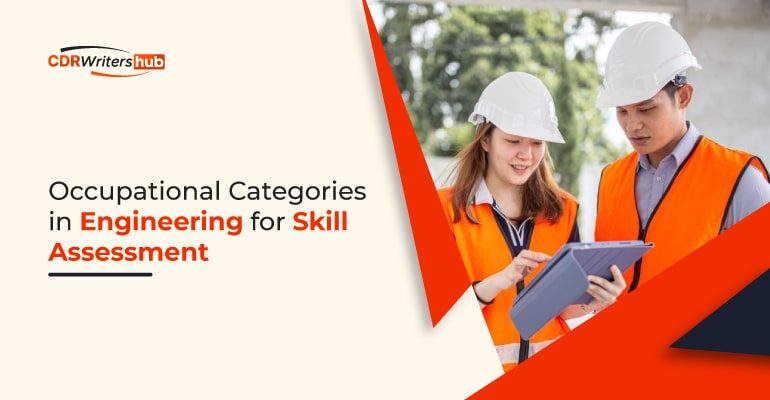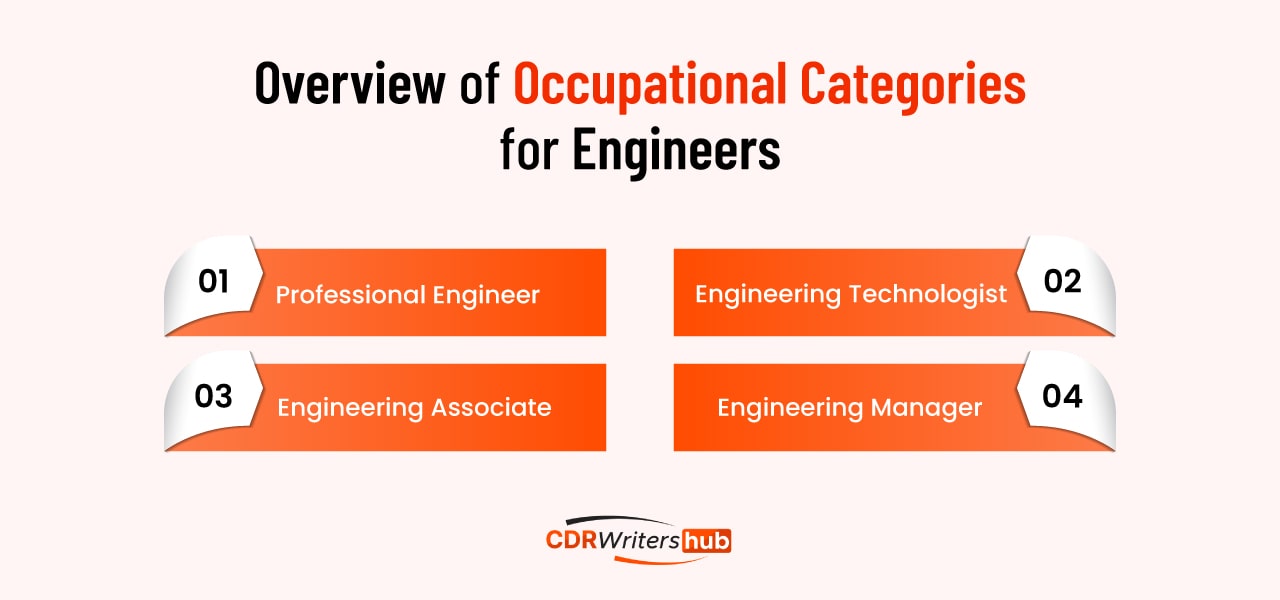Occupational Categories in Engineering for Skill Assessment

Occupational Categories in Engineering for Skill Assessment
If you are an Engineer seeking a chance to further your career, Australia can provide you with an unrivaled opportunity to advance in your selected work area. However, before you apply for a migrating visa, you must pass a competency exam for Engineers in Australia.
Documents necessary for the engineering skill assessment throughout the application process
Table of Contents
- Identity Documentation (Passport Bio Page or Detailed Birth Certificate).
- Recent Passport-Sized Photographs
- Change of Name (if any).
- Qualification Evidence (Award Certificate, Academic Transcript).
- Employment Proof (Salary Slip, Joining Letter, Taxation Records, certificates, prizes, License, and registration Documents if self-employed).
Engineers Australia is the major authority in charge of all procedures regarding the skilled migration of Engineers to Australia. Engineers Australia is also the official assessment authority for various engineering jobs. Before getting your reports prepared, you must first identify which category of engineering occupation you belong to. Engineers Australia has identified three major occupational groups within Australia’s engineering profession.
Occupational Category for Engineers

- Professional Engineer
- Engineering Technologist
- Engineering Associate
The following extra category is recognized for migration reasons.
- Engineering Manager
Overview: Professional Engineer
- The overall systems are prioritized.
- Sustainably pursues technical potential, considering environmental, community, and social problems.
- Conducts and manages engineering projects using organized approaches.
- Systematic engineering synthesis and design procedures are used.
- Using well-known technical principles to solve complicated problems.
- Professionalism is one’s occupation that is required.
After completing 12 years of education or equivalent, a professional engineer must have an academic qualification of a four-year Australian bachelor’s degree in engineering from a university. The Professional Engineer is in charge of the complete system and engineering duties. As a result, they must be able to lead since they will be interacting with clients and understanding their needs and a varied range of stakeholders and society as a whole.
Professional engineers are responsible for resolving problems and challenges as they arise and managing risk and sustainability concerns. They must ensure that technical and non-technical problems are incorporated. While engineering generates concrete results, the work of Professional Engineers is essentially intellectual.
Professional engineers are primarily concerned with creating new technologies and upgrading current ones, and they should employ innovative and creative concepts in their job. Professional Engineers may be active in engineering research and data and create new techniques and applications within a broad technical field.
Overview: Engineering Technologist
- focuses on the interactions of the system.
- Utilizes well-established engineering approaches, techniques, tools, and resources in the technical domain.
- Engineering technology progresses.
An Engineering Technologist should have a three-year Australian bachelor’s degree in engineering and a minimum of 12 years of schooling or equivalent.
The majority of engineering technologists are anticipated to work on system interfaces. However, they frequently work in broad-defined technical settings, taking on various duties and responsibilities while modifying and adapting current engineering methods. As the name indicates, they are subject matter specialists in the theory and practice of a certain field of engineering technology and its application, adaptation, or management in various situations.
There is a significant difference between Engineering Technologists and Professional Engineers. Engineering technicians do not have the same wide duties as Professional Engineers. Engineering technologists must have a thorough understanding of practical challenges and applications and the intellectual challenge of remaining current on their progress as an expert in a technology subject and how they tie it to current practice.
Overview: Engineering Associate
- focuses on certain components of the system
- Observes codes and adhere to current rules and processes
- Obtain technical support in the research, design, production, assembly, building, operation, and maintenance of machines and equipment, facilities, distribution systems, and installations.
- Aids in the estimation of resources and the inspection of the site
- Drawings, plans, diagrams, designs, maps, and charts are created, interpreted, reviewed, and amended.
The academic requirement for Engineering Associate is a two-year Australian Diploma or Associate Degree in Engineering following 12 years of study or equivalent. Engineering Associates should focus on a specific area of the system. As a result, they play several responsibilities within engineering firms and teams. Their key tasks include feasibility studies, scoping, setting criteria/performance metrics, assessing and reporting technical and procedural decisions, quality assurance, costing, budget management, document control, quality assurance, and so on.
Engineering Associates must be acquainted with professional standards and norms and specialists in their interpretation and implementation in various situations. Professional engineers and Engineering Technologists may be better familiar with various plant and equipment aspects that can add to operational safety, cost-effectiveness, or efficiency. In other cases, Engineering Associates may be well-versed in design and development techniques. The Engineering Associate occupation is usually referred to as a “paraprofessional” in Australia.
Overview: Engineering Manager
- Creates and implements engineering strategies, policies, and plans.
- Engineer operations are managed and audited on behalf of the company.
The Engineering Manager post requires a bachelor’s degree or higher in engineering or a related field after 12 years of schooling or equivalent.
The Engineering Manager is also recognized as a supplemental category for migration reasons. Engineering Manager is not an engineering occupation but a part of the Managers ANZSCO group.
The Engineering Manager evaluates engineering operations in detail and designs strategies, policies, and plans. They have a high-level executive job that includes formulating engineering strategies, policies, and plans and directing, administering, and overseeing an organization’s engineering activities.
They are in charge of designing, implementing, and monitoring engineering strategies, policies, and plans and offering engineering method assistance. They also monitor performance and ensure that engineering standards for quality, cost, safety, and timeliness are satisfied.
Engineering managers aid in the analysis and organization of engineering projects. They are in charge of personnel selection, training, development, planning, organizing, leading, managing, and coordinating its engineering and technical operations.
Introduction to CDR for Engineers
The CDR evaluation is mostly based on undergraduate qualifications and verified graduate abilities. Applicants must offer verifiable proof of BOTH:
- Core technical engineering knowledge supporting the specified occupation AND
- demonstrable application of such knowledge in the proposed occupation.
The CDR must be entirely your work. All typed components of the CDR must be done in a word processor, and you should maintain a copy. Your CDR will be evaluated in relation to the graduate competency criteria and the ANZSCO definition of the occupational category you have chosen.
Why choose CDRWritersHub?
If you have any queries concerning occupational categories or other CDR writing approaches, please contact us, and we will assign you to our finest consultant to assist you. CDRWritersHub is an Australian-registered consultant that provides RPL report writing, KA02, and CDR report reviewing services.



